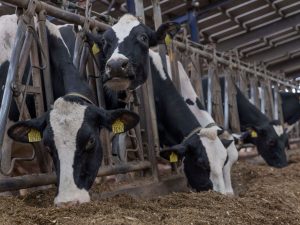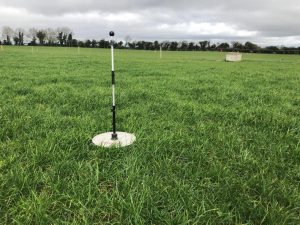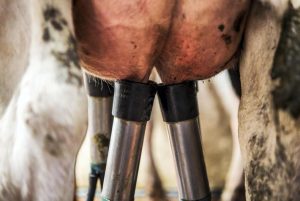
In a broad-ranging interview with AgriLand, Morrissey also detailed how some companies are in a position to respond to the shutdown of the food-service industry in many countries; whilst also detailing how the outbreak has affected consumer trends.
Starting with key destination markets for Irish dairy – particularly Asia – Morrissey noted that the fallout has been “mixed” to date.
While the Chinese market is slowly reopening, there is no denying that it has taken a significant hit.
“China is beginning to get back to work. But overall, Rabobank is forecasting down the estimate on imports of skimmed milk powder and whole milk powder – to be down 28% in 2020.”
This, Morrissey said, is part of food service having a knock-on effect on ingredients.
Their whole forecast down is based on: lower demand for food service channels; a build-up in milk powder stocks on top of large carryover stocks from last year; and then a bit of expansion in [China’s] own milk production in 2020.
Regarding any value adding or non-commodity opportunities, Morrissey explained that application is the big thing when it comes to dairy:
“If you have got a customer and you’re doing something that’s quite specific for them in terms of an application, or something that’s beyond commodity – that’s the thing.
“Something beyond the commodity product that you can do for somebody; that’s where the sweet spot is.
“Different companies may have the agility required to deploy from food service into retail – but only in some cases, with a cost involved,” she said.
However, she also acknowledged that the effective loss of the food service sector is compounded by the cancellation of global hospitality events, such as the Olympic games in Japan, the World Expo in Dubai and the Euro 2020 football championship – events that would normally lead to big spikes for consumption at food service level.
Imbalance
This dramatic drop in demand has led to a supply-demand imbalance, which is where the margin of pressure is coming in.
However, it is still very much the early days of the current situation meaning it is very difficult to give a prognosis, the manager highlighted, adding that the current three-month period, the second quarter of 2020 will be the real “telling point” as to how things will go.
Continuing, Morrissey pointed to the drastic impact across the Atlantic in the US, explaining:
“The food service in the US accounts for about 50% of the dairy consumption and it accounts for 55%+ of cheese consumption.
“That’s huge – whereas if you look at Europe it accounts for about 35% of dairy consumption. We’ve got a serious shock in Europe – but not to the same extent that the Americans have.”
The manager warned that Irish exporters would compete with the US for some markets, which would want to be watched.
With the US domestic market affected so badly, American exporters will become more competitive in some of the markets in south-east Asia, she warned.
“It just means the whole market is going to be a little bit more volatile,” Morrissey said, adding that cheese will be especially exposed to this threat.
Economic Aftermath
Turning to other countries such as Japan, she noted that much of the Irish dairy exports in this market go to manufacturing – and, as such, they haven’t been as severely affected.
“Japan on cheese [imports] is well up on last year for the first few months of this year. You’re still talking about a low enough base but it does show you that these Asian markets are important markets.
“It’s not like the demand has fallen off or anything like that. There is still demand coming from the markets.”
However, she warned that it will be the “economic aftermath” of the virus that will determine any lasting impact on Asian markets.
“This will have an economic impact in particular on countries that rely heavily on tourism and the movement of people.
All of those countries will be affected; again Rabobank is forecasting their dairy imports to be down – but I think, when the virus does eventually work its way through, it’ll be really about how their economies are able to perform afterwards.
“If you think about the virus, it’s not going to have such a big impact in terms of demand – it’ll be more about the affordability of it; what can actually be paid for dairy. That’s where the big issue around price comes in,” Morrissey said.
In addition, when food service resumes, there will be issues in terms of consumer demand levels, but there may also be issues around affordability. If so, there will be downtrading with food service and dairy will be affected, she warned.
Consumer Trends
Turning to the topic of consumer trends, the manager noted that there has been a definite impact on consumer behaviour.
“The food-service industry is beginning to open up in China; they’re saying that between 50% and 60% of restaurants have reopened in Shanghai. All the big restaurant chains have made it through the crisis; but some of the smaller restaurants haven’t reopened.
“But they’re saying that 90% of the McDonalds and Starbucks stores are now back open for business in China, whereas in Europe they’re all still closed.
The challenge though is, while they’re open for business, people are still quite concerned about sitting too close to people and that’s still going to affect people’s views – and people’s sense of risk is still playing heavily on their minds.
“So while things are open, consumers are a lot more cautious about either being close to other people or they are more cautious about having somebody else prepare their food,” she said.
But ultimately, at some point further Covid-19 restrictions will start to ease and demand for dairy will rise once more.
“When things start to open up and when the schools go back, cheese will go back into lunchboxes and dairy will go back into canteens.
“The demand is still going to be there – people will get back to work. It’s going to take a while, but it will happen.
“People will eventually start to travel again and in terms of airlines, Ireland’s dairy products will be back on board. It’ll just take time but they will come back.
“For now, I think it’s really a case of how long we have to wait,” Morrissey concluded.

























